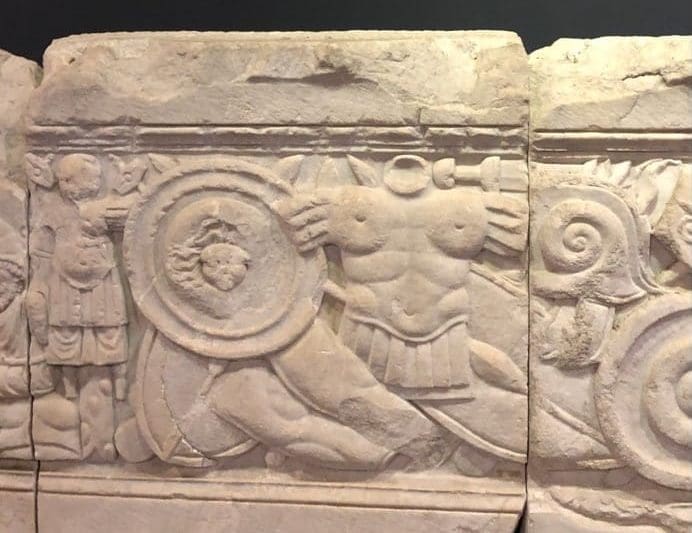Where Is The Spear? - Enjoying the Journey
“Wherefore take unto you the whole armour of God, that ye may be able to withstand in the evil day, and having done all, to stand” (Ephesians 6:13).
When Paul wrote to the church at Ephesus, he used imagery that was familiar to residents of the east of the Roman Empire. Specifically, he used a Greek word, panoply, to describe the Christian’s armor. This word refers to the expected set of armor with which a legionary should be equipped. Occasionally, some will say that the warrior depicted in Ephesians 6 is a gladiator. This is unlikely since gladiators generally fought barefoot on arena, on sand, and the fighter we are discussing has shoes.
However, in his list of implements of war, one weapon is curiously missing from the panoply: the spear. We can assume one of two possibilities: it was an oversight on Paul’s part, or it was deliberate. As people accustomed to organized violence, residents of Ephesus would have immediately noticed that the pilum, the spear was missing and looked closer at the text. When they did, I believe they would have seen that the exclusion of the spear was not an oversight, but was a subtle hint as to the urgency of the battle.
Roman Soldiers
The Roman soldier’s most hated weapon was the pilum. It was not as much hated by Rome’s enemies so much as it was hated by the infantryman who had to carry it everywhere he went. One writer observed that when the order was given to throw the pilum, legionaries did so with gusto, not because they hated the enemy but because they hated the spear. Most spears used in ancient warfare served multiple purposes outside of combat. They could be used as a walking stick, a quarter staff, or three together could be used to improvise a tripod. Two spears stuck down the sleeves of a tunic could serve as a passable stretcher when needed. The Roman legionary’s pilum had all of these advantages stripped away to solve a problem.
The difficulty with spears is that once thrown, the enemy can simply pick them up and throw them back. The pilum was designed to solve this via multiple built-in failure points. However, the solution made the spear useless and heavy outside of direct combat. The pilum was four feet of wood, usually ash, at the end of which was a soft iron point which was another 30 inches in length. This soft metal point was designed to bend on impact, making it unusable by the enemy. In times of peace, Roman soldiers had to be careful not to damage the spear, since the point could only be straightened a couple of times before it had to be replaced. Any such repair or replacement came out of their salary.
Christian Soldiers
The first step in a Roman infantry battle was to launch the spears in unison. Ideally, the heavy spears would lodge in the enemy’s shields and bend downwards, making the shield an encumbrance to discard. Then, the command to charge would soon follow and the legionaries would attack the unshielded foe. I believe that is the moment of Ephesians 6. We are in the battle line and we have already launched our spears at the enemy. However, the enemy is responding with a missile attack on us. So we take our shields of faith, our breastplates of righteousness, and our helmets of salvation, and we use them to quench the incoming fire from the enemy.
How are you to survive the fiery darts of the wicked one? Trust your shield and your helmet. In the words of one writer, “Plant your shield in front of your body, and bow your head.” Arrows, and even spears, would glance off the top of the rounded steel helmet of the soldier. In the evil day when our enemy attacks, we can survive with God’s armor, and a bowed head.
Once ancient armies had exchanged missile fire, whether arrows or spears, the next step was to advance. So Paul is showing us that we stand shoulder to shoulder, not as a last-ditch effort or out of desperation. Instead, “having done all,” that is, having fully prepared, we stand with our swords drawn, waiting for the order to march forward into the thick of battle. Christian, are you fully armored? Or are you standing in the battle line unprepared?

Altar of Domitian from 1st century Ephesus. The altar shows several of the important elements of the panoply, such as the shield, sword, and breastplate. The articles shown are for a cavalryman, which were slightly different from a common legionary’s equipment. Photo by John Buckner
For further study on the Amour of God, listen to Scott’s Series, “A Good Soldier of Jesus Christ.”





